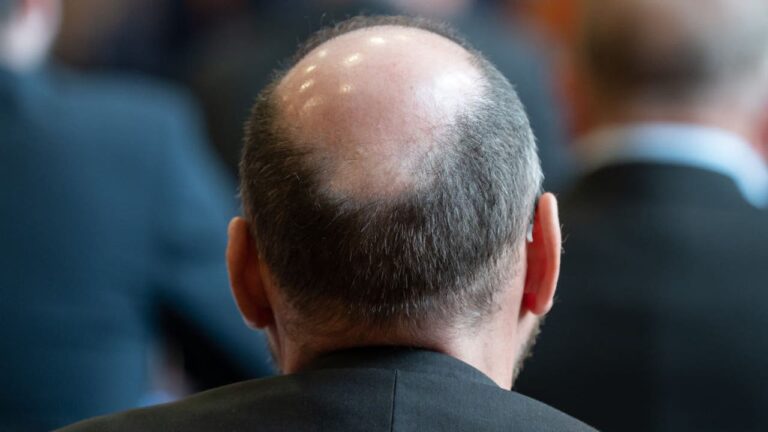article
A half-bald man. Photo: Silas Stein/dpa (Photo Credit: Silas Stein/picture Alliance via Getty Images)
A cure for male pattern baldness may already exist in humans.
This disease, which causes gradual hair loss, affects up to 50% of men worldwide.
Researchers at the University of Sheffield in the UK claim the solution could be found in sugars that occur naturally in the human body.
The study, published in the journal Frontiers in Pharmacology, shows that the sugar, known as 2-deoxy-D-ribose (2dDR), is involved in a variety of biological processes in animals and humans, and that revealed that it has the potential to stimulate regeneration.
Scientists from Sheffield in the UK and COMSATS University in Pakistan have been studying sugar for the past eight years, focusing on its ability to form new blood vessels and help heal wounds.
Researchers noticed that the hair around the wound appeared to grow faster compared to untreated wounds.
The scientists then tested this on testosterone-induced hair loss in mice, similar to the cause of male pattern baldness, according to a university press release.
Researchers say major discovery could lead to new hair loss treatments
Applying just a small amount of sugar led to the formation of new blood vessels and hair regrowth.
According to the university, the study results suggest that deoxyribose sugar may be as effective as hair growth drugs.
Dr Sheila McNeil, emeritus professor of tissue engineering at the University of Sheffield, said male pattern baldness could benefit from further research.
“Currently, there are only two FDA-approved medications for this condition,” she said in a statement sent to Fox News Digital.
Choose the hairbrush that best suits your hair type
“Our UK-Pakistani collaboration has unexpectedly uncovered a small naturally occurring sugar that stimulates the formation of new blood vessels. We were delighted to discover that it also stimulates hair.”
McNeil said sugar is “natural, cheap and stable” and can be provided in an “easy-to-apply gel”, which the researchers plan to explore in further studies.
Dr. John White, chief medical officer at WebMD in Washington, D.C., called the study results “interesting” in a conversation with Fox News Digital.
“The effectiveness of this naturally occurring sugar shows great potential in developing new hair loss treatments,” said White, who was not involved in the study.
Bad hair day? Research says you may want to blame relatives or family members
Current treatments “have been around for some time, but their effectiveness is limited and they can have side effects,” the doctor noted.
Given that this research is still in its early stages, further research and clinical trials are needed to determine whether sugar can be “safely and effectively developed as a viable treatment for male pattern baldness.” , White added.
“The public should view these results with cautious optimism,” he continued.
“This study offers hope for a new natural treatment for hair loss, but further research is needed before it can be considered a cure.”
Dr. Brendan Camp, a New York dermatologist, also reacted to the findings, reiterating to Fox News Digital that there are limited treatments available for hair loss.
“Many potential treatments are being studied, but none have been found to be curative,” said Camp, who was not involved in the study.
“The current goal of alopecia treatment is to help patients keep their hair.”
For more health stories, visit www.foxnews/health.
If future research is successful, this research could ultimately lead to new and effective treatments, he said.
“The treatment in question, 2-deoxy-D-ribose (2dDR), is thought to improve hair growth by increasing the number of blood vessels,” he said.
“Although potentially effective in stimulating the growth of existing hair follicles, it seems unlikely that hair follicles that have already disappeared will grow back.”
“Although this treatment is promising, additional research is needed to confirm the reproducibility, efficacy, and real-world application of 2-deoxy-D-ribose (2dDR) as a treatment for alopecia,” he said. is necessary,” he added.
Read the rest of this article on FOX News.

